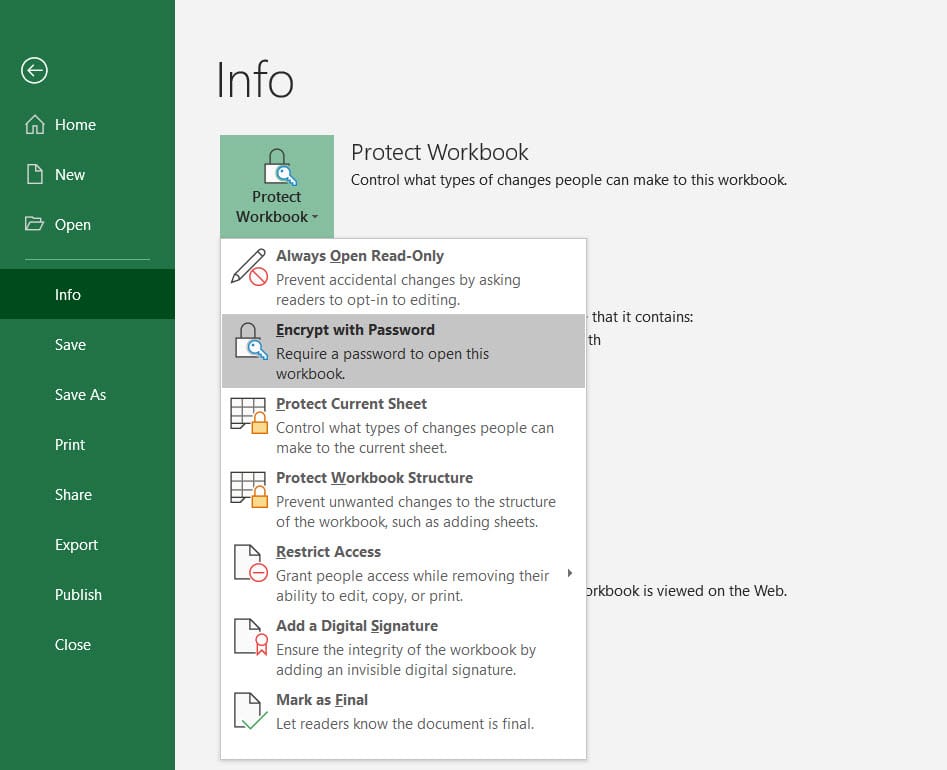Secure Your Data: How to Password-Protect Excel Sheets

In today's digital world, the importance of data security can't be overstated. Protecting your Excel spreadsheets with passwords is an essential step to ensuring that your sensitive information remains confidential. Whether you're a business professional safeguarding financial data, a student protecting your research, or someone with personal information that needs to remain private, password-protecting your Excel sheets is a crucial practice. Here’s a comprehensive guide on how to secure your Excel data effectively.
Why Password-Protect Excel Sheets?

Password protection adds a layer of security, preventing unauthorized access. Here are some reasons to consider:
- Confidentiality: Keep proprietary information confidential.
- Integrity: Prevent accidental or malicious changes to your data.
- Compliance: Meet data protection and privacy regulations.
How to Password-Protect Your Excel Sheet

Excel provides several methods to protect your data. Let’s go through each:
Setting a Password for the Entire Workbook

To secure your workbook entirely:
- Open your workbook in Excel.
- Click File, then Info.
- Select Protect Workbook and then Encrypt with Password….
- Type in a password and confirm it.
- Save your workbook.
🔒 Note: Be cautious with password choice. Avoid common words or phrases. Use a strong password combining letters, numbers, and symbols.
Password-Protecting a Specific Sheet

If you only need to protect parts of your workbook:
- Select the worksheet you want to protect.
- Go to the Review tab.
- Choose Protect Sheet.
- Set a password, define allowed actions, and click OK.
- Re-enter the password to confirm.
Important Considerations:
- Allow only specific cells or ranges for editing.
- Restrict access to certain features like formatting cells or sorting data.
🔍 Note: Remember what actions are allowed when setting sheet protection. Too many restrictions can hinder workflow.
Password-Protecting an Excel File

This method focuses on protecting the file rather than its contents:
- Go to File > Save As.
- Select your preferred location and format.
- Click Tools near the Save button, then General Options….
- Enter passwords for opening or modifying the file.
- Save your changes.
Best Practices for Password Protection

To maximize security, consider these best practices:
- Use Strong Passwords: A mix of upper and lower case letters, numbers, and symbols makes passwords harder to crack.
- Regular Updates: Change passwords periodically, especially if there’s a chance they’ve been compromised.
- Remember Your Passwords: There’s no reset option for lost Excel passwords. Keep them safe.
- Backup: Always keep a backup of your protected files to avoid data loss.
Recovering or Removing Passwords

Excel does not provide built-in recovery tools for forgotten passwords, but here are some options:
- Use a Password Recovery Tool: Commercial software can help in recovering or removing passwords from Excel files.
- Contact IT Support: If the file is work-related, your IT department might have recovery solutions.
🛠 Note: Password recovery tools might not work for all Excel versions or protection methods. Always back up before attempting recovery.
By following these steps and best practices, you're significantly enhancing the security of your Excel data. Whether you're protecting financial spreadsheets, customer databases, or personal notes, password protection offers an essential shield against unauthorized access. Stay vigilant about the passwords you set, keeping them strong yet memorable. Lastly, while Excel password protection is a strong measure, remember it's part of a larger data security ecosystem. Combine it with other security measures for comprehensive data protection.
Can I protect individual cells in Excel?

+
Yes, you can protect individual cells within a worksheet by locking them when you protect the sheet. However, the entire sheet must be protected to secure specific cells.
What if I forget the password to my Excel sheet?

+
If you forget your password, you can use password recovery tools, but their effectiveness varies. Without recovery options from Microsoft, always store your passwords securely or keep a backup.
Does Excel password protection prevent unauthorized changes?

+
Yes, password protection can prevent unauthorized access or changes to the file, sheet, or cells, depending on how you set it up. Users without the password won’t be able to modify or view the data as per your restrictions.



